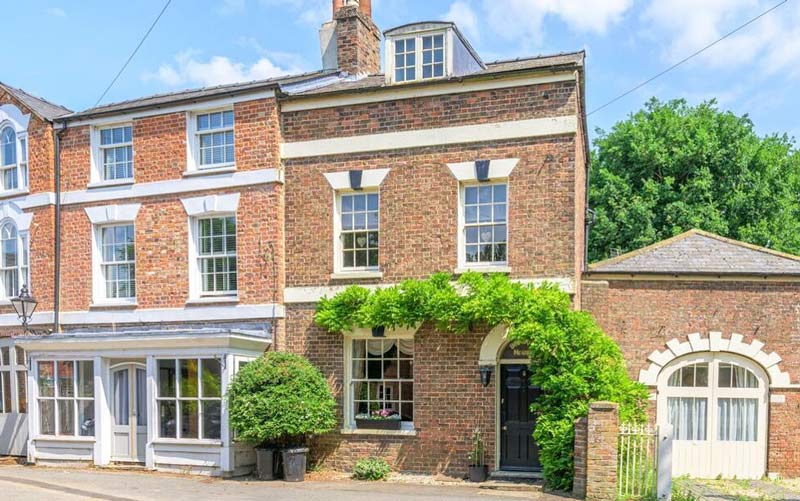Are house prices still rising in your area?
If you’ve been thinking about moving, you’ve no doubt seen lots of headlines about house prices, and forecasts about if they’re going to fall this year.
Our monthly House Price Index is based on the largest and most up-to-date number of homes currently for sale, so we’re able to identify any changes to the housing market in real time. It gives a picture of what’s happening at a national scale, but also at a regional level.
This month, some new home sellers have been adjusting their asking price expectations as home-buyers face increasing affordability challenges following mortgage and interest rate rises. So we’ve seen the average asking price of a home in Great Britain drop by 0.2% (-£905) in July to £371,907.
This is slightly below the 0% norm for this time of year, and follows a drop of £82 in June. You can read our July House Price Index in full here.
Will house prices continue to fall this year?
House prices have proved more resilient than most expected during the first half of the year, and are now 2.6% higher than in January.
At the start of this year, our forecast was that average asking prices would drop by 2% over the year to December, which is still looking likely. However, to put this into context, prices are 20% higher than they were in July 2019 before the pandemic (when the average asking price was £308,692).
The current average asking price is also 0.5% higher than last year, however some regions have started to see annual price drops.
What’s happening with asking prices in your region?
There are regional variations of average asking prices, with prices changing at different rates.
And average prices have actually increased over the month to July in four regions across Great Britain.
In East Midlands, the average asking price of a home has risen by 1.1% to just below £290,000, up by 1.8% in the past year.
In Yorkshire & Humber, prices have risen by 0.7% in a month to £248,755, up by 2.1% in a year. The South West region has also seen asking prices rise by 0.2% to £396,990, up by 1.4% in a year.
In London, the average asking price has now reached £688,526, which has increased by 0.5% over the month. But compared to a year ago, average prices have dropped by 0.6%.
All other regions have started to see monthly price drops, with average prices in the South East and in the East of England also marginally lower than a year ago.
You can check what’s happened to house prices in the region where you live below, or in our latest report.
Average regional asking prices in Great Britain
| Region | Avge asking price July 23 | Monthly change | Annual change |
|---|---|---|---|
| North East | £184,632 | -2.0% | 0.4% |
| Scotland | £192,030 | -0.7% | 3.6% |
| Yorkshire & Humber | £248,755 | 0.7% | 2.1% |
| North West | £255,354 | -0.8% | 1.9% |
| Wales | £260,683 | -1.3% | 1.9% |
| West Midlands | £289,242 | -0.9% | 0.6% |
| East Midlands | £289,777 | 1.1% | 1.8% |
| South West | £396,990 | 0.2% | 1.4% |
| East of England | £425,855 | -0.1% | -0.6% |
| South East | £490,386 | -1.1% | -0.4% |
| London | £688,526 | 0.5% | -0.6% |
What does this mean if you’re thinking of moving?
There have been a lot of headlines about interest rate and mortgage rate rises in the past few weeks.
Our property expert Tim Bannister says: “The unexpectedly sticky inflation figures, and the surprise of further mortgage rate rises, have contributed to the fall in average house prices and number of sales agreed.”
Some home-movers are putting their plans on hold until there is more certainty that mortgage rates have stabilised. However, there is still a large volume of motivated home-buyers who can factor rate rises into their budgets and are continuing to enquire about homes for sale. In fact, demand from buyers is still higher than 2019’s more normal market level.
“First-time buyers, trader-uppers and downsizers with higher deposits and lower mortgage requirements appear to be still keenly searching the market, not wanting to miss out on the right property that is not over-priced and that they can still afford,” says Tim
“Sellers who price right the first time, rather than starting with too high an asking price only to reduce later, have a much better chance of attracting one of these motivated buyers, and a good local estate agent will provide sellers with accurate evidence of prices that are being achieved in their area,” he adds.
What’s happening with mortgage rates?
Our mortgage expert Matt Smith, says there are signs that mortgage rates are reaching a peak after the market turbulence over the last two months.
He says: “There’s been an increase in average rates compared with last week, but we may now see some lenders begin to cut rates as soon as the coming days. However, any cuts to rates are likely to be small, at least to begin with.”
You can keep an eye on the current UK mortgage rates for different deposit sizes here and check how they compare to last week’s average rates.
If you’re thinking of moving, a mortgage broker or adviser can talk through your specific circumstances to help determine the best lender for you, as well as explaining the type of mortgage that might be the best fit.
You can also apply for a Mortgage in Principle online, to give you an idea of how much you could borrow. It’s quick, free, and your credit score won’t be affected.
READ MORE: How are mortgage and interest rate rises impacting house prices?
The header image of this article is provided courtesy of Aspire Homes, Wisbech



